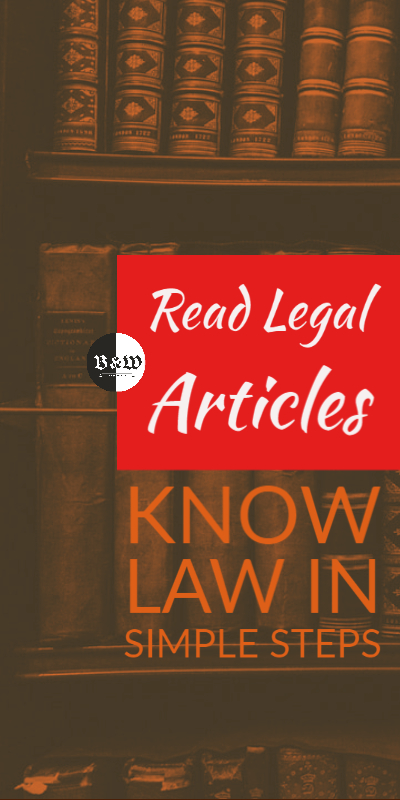Cheque Bounce - Section 138 & Section 139 The Negotiable Instrument Act 1881
If bank cheque is returned unpaid, by the amount in account being insufficient to honor, an offence has been committed under Section 138 of Negotiable Instrument Act.
Central Government Acts - Section 138 & Section 139 The Negotiable Instrument Act 1881 for Cheque Bounce
The Negotiable Instrument Act 1881 is a law that governs the usage of negotiable instruments.
The Negotiable Instrument Act 1881 is the primary legislation for all matters relating to negotiable instruments. It was enacted in 1881 and has been amended from time to time. The act governs the usage of promissory notes, bills of exchange, cheques and other instruments that are transferable by endorsement or delivery.
This section discusses the Negotiable Instrument Act 1881, which is a law that regulates the use of instruments in a transaction. It is also important to note that this Act only applies to instruments that are negotiable.
Goal of Negotiable Instrument Act
The main goal is to instill trust in the use of negotiable instruments, such as checks, in financial transactions. The penalty clause of Section 138 of the Negotiable Instruments Act is intended to prohibit the issuance of negotiable instruments such as checks without a sincere intention to honor the promise implicit in their issuance.
Section 138 – Dishonor of cheque for Insufficiency of Fund
Legality of Object: The act of maintaining a bank account and writing checks to pay any amount of money to another person is a legal preview matter. In this case, the payment is either all or part of the liability or debt.
The Offence: If the cheque is returned unpaid, either by the amount in account being insufficient to honor the cheque or it exceeds the amount to be paid by an agreement made with bank, this is considered as offence.
The Punishment: The offence of dishonoring the cheque is without prejudice to any other provision of this act, is punishable with imprisonment for a term extending to two years, or a fine extending to twice the amount of the cheque, or both.
Terms to note, how action can be initiated:
- The cheque should have been presented within 6 months from date on which it is drawn or within the period of its validity – whichever is earlier
- The payee or the holder of the cheque makes a demand of the payment of the said amount, by giving a notice in written to the drawer of the cheque, within 30 days of the return of the cheque
- The drawer of the cheque fails to make payment within 15 days of the receipt of the notice
A Case Reference – Conviction in ‘Negotiable Instrument Act’
Appeals have been filed against Judgement order dated 21 – 11- 17 of High Court (Punjab & Haryana), allowing a Criminal Revision Petition being filed by accused (Respondent). The case progress across various court levels is depicted below:

Analysis of Trail Court’s Judgement
A cheque was issued by the respondent-accused to the appellant-complainant
The Court found that the cheque was duly issued by the respondent to the appellant and that it is a paid debt or liability.
Desire: The Court has arrived at a favorable decision for the appellant-complainant.
Analysis of Appellate Court’s Finding
The Trial Court and the Appellate Court y arrived at a specific concurrent factual finding. The Trial Court and the Appellate Court rejected the plea of the respondent-accused that the appellant-complainant had misused a blank sign checkbook.
Interest: It is in this context that we must analyze the specific concurrent factual finding arrived, by both courts on their respective day, with regard to a very important plea by the respondent-accused that in all probability, misleads us.
Desire: Both Courts rejected this specific plea by the respondent-accused to effectively dismiss it as being insubstantial and without merit.
Action: Consequently, a conclusion that it was for both Courts
High Court’s Misconstruction of Section 139 Negotiable Instrument Act
Fiduciary relationship does not only involve trust but also confidence and dependence. If one of the parties relies on the other's judgement or expertise, a fiduciary relationship is created.
Agitate: The complainant had a fiduciary relationship with the accused-petitioner. This means that he was given a blank cheque by the latter in order to prove that there was an agreement to pay back the loan amount and that the petitioner's failure to repay it is not justified.
Solve: The Court of Appeals handed down their decision holding that there was no sufficient proof that a fiduciary relationship existed between them in this case.
Problem: The complainant is guilty of misappropriating a blank cheque
Agitate: Faulty audit procedures may have allowed the complainant to replace a blank cheque with their own
Solve: In such cases, the accused can successfully raise reasonable doubts and avoid conviction.
ANALYSIS:
Problem: The court of law has refused to consider the presumption in the Negotiable Instruments Act which is contrary to the stated objectives of the intent in passing this judgement and order.
Agitate: This judgement and order will create a legal loophole for cheque dishonor, fraudsters, and a nightmare for check holders and account holders alike.
Solve: The High Court should review this judgement and order as soon as possible before it becomes difficult to prove that a cheque received by the holder is one of the kinds referred to in Section 138. The sooner it gets reviewed, the better.
The accused person with respect to the cheque, has to prove that the cheque was not in discharge of any debt or other liability.
In Hiten P. Dalal vs. Badrinath Banerjee3, this Court held that both Section 138 and 139 require that the Court shall presume the liability of the drawer of the cheques for the amounts for which the cheques are drawn
Section 139 Introduces Exception & Presumption of Law
- Section 139 is an exception to the general rule as to the burden of proof and shifts the onus on the accused.
- The burden of proving any fact necessary to establish a guilt under this Code is upon the prosecution.
- Except as provided in this section, where a person is charged with an offence under this Code, he shall be presumed innocent until he is proved guilty. The presumption under Section 139 of the Negotiable Instruments Act is a presumption of law. It is not a presumption of fact. It presumes that an instrument was dishonored by the drawer and not by any other person.
- This section applies to instruments which are negotiable instruments as defined in this act or instruments which are expressed to be payable on demand and have been dishonored by non-acceptance or non-payment or otherwise.
- In the absence of any finding that the cheque in question was not signed by the respondent-accused or not voluntarily made over to the payee and in the absence of any evidence with regard to the circumstances in which a blank signed cheque had been given to the appellant-complainant, it may reasonably be presumed that the cheque was filled in by the appellant-complainant being the payee in the presence of the respondent-accused being the drawer, at his request and/or with his acquiescence.
- The subsequent filling in of an unfilled signed cheque is not an alteration. There was no change in the amount of the cheque, its date, or the name of the payee. The High Court ought not to have acquitted the respondent-accused of the charge under Section 138 of the Negotiable Instruments Act.
Supreme Court’s Order
Section 138 of the Negotiable Instruments Act, 1881 states that "the subsequent filling in of an unfilled signed cheque is not an alteration". The subsequent filling in of an unfilled signed cheque is not an alteration. There was no change in the amount of the cheque, date and name of the payee. The burden of proof is on the appellant-complainant to prove that he had advanced the loan. The High Court patently erred in holding that the burden was on the appellant-complainant to prove that he had advanced the loan.
The Supreme Court of India upheld the conviction of the respondent under Section 138 of the Negotiable Instruments Act.
The Court also ruled that the respondent is guilty of passing a cheque without sufficient funds with intent to defraud and sentenced him to undergo rigorous imprisonment for three months.
Black&White law Media – Legal Research & Representation in Bank Frauds Cases and Pursuance of Claims
Black&White Law Media has a team of experience lawyers, legal researchers and other professionals who work in the field of law. We have a vast experience in this area, and we are always ready to help anyone who needs it.
We provide a reliable claims, recovery, and financial disputes resolution with precision under legal preview. We have the capability of providing professional and experienced legal services to our clients.
Our research in law procedures and acts has enabled us to provide a reliable claims, recovery, and financial disputes resolution with precision under legal preview. We have the capability of providing professional and experienced legal services to our clients.





